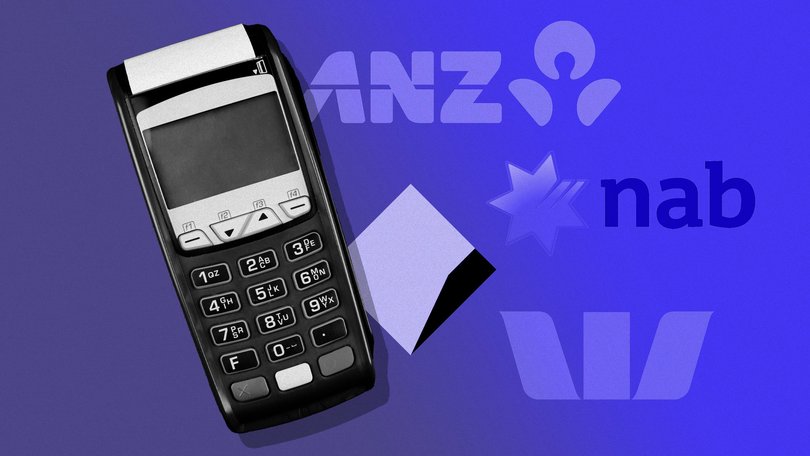Commonwealth Bank accuses RBA of being unable to count
Australia’s biggest bank says the central bank is exaggerating the benefits of a plan to cut credit and debit card charges.

Australia’s biggest bank has accused the Reserve Bank of Australia of being unable to count.
The Commonwealth Bank of Australia said the RBA got its figures wrong when it estimated that a plan to lower debit and credit card transaction charges would save businesses $1.2 billion a year and benefit nine-in-10 companies.
“We do not believe that these assumed benefits will materialise for consumers or Australian businesses,” the bank said in a submission to RBA’s Review of Merchant Card Payment Costs and Surcharging.
Sign up to The Nightly's newsletters.
Get the first look at the digital newspaper, curated daily stories and breaking headlines delivered to your inbox.
By continuing you agree to our Terms and Privacy Policy.This was despite the Reserve Bank arguing the banks would fully pass on any savings.
The Commonwealth, Australia’s biggest company, and rivals Westpac, NAB and ANZ, and credit card provider Visa, are fighting a Reserve Bank of Australia plan to further restrict interchange fees on EFTPOS, Mastercard and Visa transactions.
They argue the plan will force consumers to pay more for everyday goods, give them less access to credit and cost them frequent-flyer-type rewards.
Customers worse off
The big banks support an RBA plan to scrap surcharge fees or what merchants charge customers on top of the actual cost of doing a transaction, which would bring Australia into line with the European Union.
But they are opposed to the Reserve Bank’s proposal to curb interchange fees, or what it actually costs the likes of Visa and Mastercard to process a transaction.
“The modelling shows that under the proposed interventions, consumers will be worse off as they face higher rates and fees, less access to credit, and loss of benefits including rewards,” the Commonwealth Bank said. “Some merchants will be unable to pass on these costs and will experience reduced margins.”
Westpac argued more regulation on interchange fees would drive up consumer prices.
“Supermarkets, fuel stations, fast food outlets, hardware chains and department stores process very large payment volumes which allows them to access lower volume-based merchant rates,” it said.
“Under the proposal, these lower merchant rates would be removed, almost certainly prompting large retailers to reprice their goods and services. This would translate into higher prices at the checkout for consumers and ultimately, contribute to inflationary pressures across the economy.”
NAB argued restricting interchange fees would encourage more Australians to use buy now, pay later apps - such as Afterpay, or even go back to using cash or cheques, which are being phased out in June 2028.
“This would drive customers to alternative payment methods such as three-party card schemes, Buy Now Pay Later (BNPL), cash or cheques, which are more costly payment methods for merchants to accept,” its submission said.
ANZ complained the RBA proposal was unfair on banks by exempting buy now, pay later apps, creating “an uneven playing field for competition, as there is no oversight of payment costs”.
Payments giant Visa argued further capping interchange fees “could constrain access to credit for small businesses or drive merchants towards higher-cost, unregulated alternatives such as three-party networks”.
But the Council of Small Business Organisations argued limiting interchange fees “could reduce costs for those small businesses that are already absorbing these fees into their pricing models”.
Shop floor
Gold or platinum credit typically have higher interchange fees, which fund reward programs.
Canstar data insights director Sally Tindall said existing interchange fees on both credit cards and debit cards, meant debit card customers were missing out on rewards as they cross-subsidised credit card customers.
“Those fees in part help fund reward programs - that’s why the banks are saying we might see a downgrading in the value of rewards that are being offered and that might be the case,” she told The Nightly.
The capping of interchange fees, as surcharges are banned, could also see shops pass on costs to customers.
“If shops cannot pass on a surcharge to customers, then they have got a difficult decision in front of them because they’ve got to decide, ‘Okay, do I wear that cost or do I pass in on in higher prices?’ and they might choose a little bit of both,” Ms Tindall said. “In this very complex process, some people will have to wear some of this cost.”
The Australian Banking Association on Wednesday flagged opposition to the RBA proposal on interchange fees, a day before the Reserve Bank published the submissions.
The RBA has regulated interchange fees since 2003 but this doesn’t cover three-party card schemes like American Express and Diners Club.

